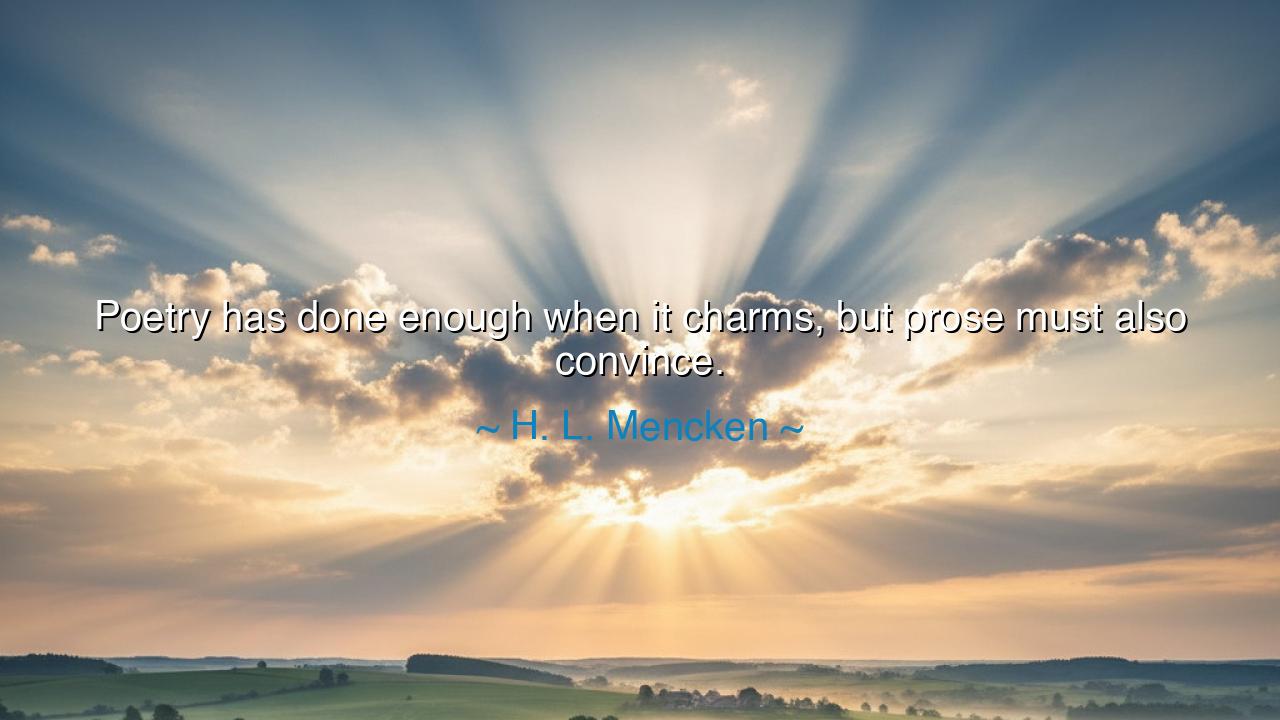
Poetry has done enough when it charms, but prose must also






The words of H. L. Mencken gleam with sharpness, as though forged in the fire of clarity: “Poetry has done enough when it charms, but prose must also convince.” In these lines, Mencken draws a distinction between two great pillars of language. Poetry, he says, fulfills its purpose when it enchants the spirit, when it awakens awe, beauty, or emotion in the listener. It is the music of words, the spell of rhythm, the fragrance of thought. But prose—the language of reason, law, and daily discourse—must go further. It cannot rest in beauty alone; it must persuade, prove, and endure the testing of logic.
The ancients knew this well. The poets of Greece sang of gods and heroes, and their verses charmed nations for centuries. The songs of Homer were enough to inspire warriors, to move the hearts of citizens, to carry wisdom cloaked in imagery. But when the Athenians gathered in the courts, or when orators like Demosthenes addressed the assembly, they relied not on charm but on argument. Prose was called upon not to delight but to convince, to win judgment, to stir action, to shape policy. Thus Mencken’s words are no mere wit—they are a reflection of the eternal roles of beauty and reason in human speech.
When Mencken says poetry charms, he means that it touches something primal in us, beyond logic. A poem need not be proven true; it need only resonate with the heart. It is enough for a verse to move us, to plant an image, to leave us breathless. The line of Shakespeare or the hymn of a psalm can endure centuries, not because they have convinced us of an argument, but because they have touched our spirits with beauty. Charm is the crown of poetry, and in charm its duty is fulfilled.
Yet for prose, this is not enough. A treaty, a speech, a law, or a scientific explanation must do more than charm the ear—it must convince the mind. If it fails in this, it fails entirely. Consider the Gettysburg Address: though clothed in beauty, its power lies also in conviction. Lincoln convinced his people that their sacrifices were not in vain, that the nation’s rebirth was possible, that democracy must endure. Or think of Cicero, who stood before the Roman Senate, not as a poet but as an orator, using prose to expose conspiracy and to rally the republic. His words were sharp not because they charmed, but because they persuaded.
The deeper meaning of Mencken’s teaching is that different forms of language serve different masters. To demand from poetry the rigor of prose is to diminish its wonder. To accept from prose only the charm of poetry is to endanger truth. Each has its place: poetry, to inspire; prose, to establish. The wise soul understands this and learns to wield each with discernment, calling upon song when the heart needs stirring and upon argument when the mind demands clarity.
The lesson is thus: honor both beauty and truth in language, but do not confuse them. When you speak in poetry, let your goal be to awaken; when you speak in prose, let your goal be to persuade. Remember that a world built only on charm collapses, for beauty without reason drifts into illusion. But a world built only on argument starves the heart, for reason without beauty is barren. Balance them both, and you will hold the power to move souls and shape destinies.
Practical actions follow: read poetry, and let yourself be charmed, for this nourishes the soul. Read prose, and let yourself be convinced, for this sharpens the mind. When you speak or write, ask yourself: is my purpose to charm or to convince? Shape your words accordingly. And above all, remember Mencken’s wisdom—that language is many-sided, and its greatness lies in knowing when to sing like a poet and when to reason like a sage.






NQN QT
Mencken’s view that poetry has done enough when it charms, but prose must also convince, seems to emphasize the rationality behind prose. But does that mean prose has to be dry or purely logical to be convincing? Can prose be emotional, poetic, and still make a solid argument? Where is the balance between charm and conviction in prose, and how do writers find this middle ground?
DDDau dau
I agree with Mencken’s perspective that poetry charms while prose convinces. But it makes me wonder—can prose ever be truly poetic? Some of the most compelling essays, speeches, or novels have a poetic quality to them. Is the true value of prose not just in persuasion but also in how it can move or inspire? How do writers balance these elements in their work to make it both convincing and emotionally engaging?
CAChanh Adela
Mencken’s quote seems to suggest that poetry has a more emotional role, whereas prose is meant to carry a logical argument or message. This distinction got me thinking—does this mean prose is less 'artistic' than poetry? Can prose ever be as impactful and evocative as poetry, or is its power rooted in its ability to persuade and convey ideas clearly? What makes prose convincing—its structure, its facts, or its emotional resonance?
DANguyen Duy ANH
H. L. Mencken’s quote highlights the different purposes of poetry and prose, which is an interesting distinction. Poetry often works by evoking emotion and beauty, while prose is about communication and clarity. But can prose still have charm, and can poetry convince? Is there a line between these two forms, or do the best writers manage to combine both qualities, where poetry charms and prose convinces simultaneously?